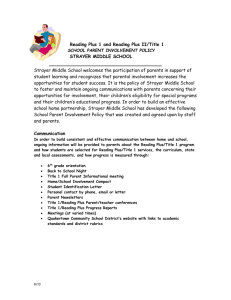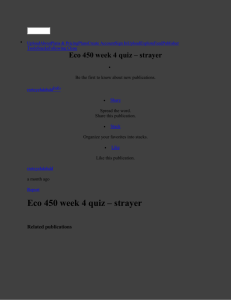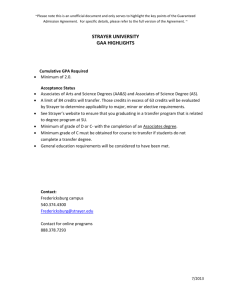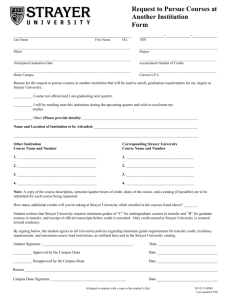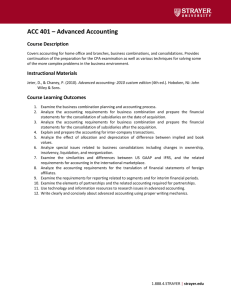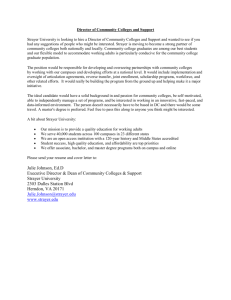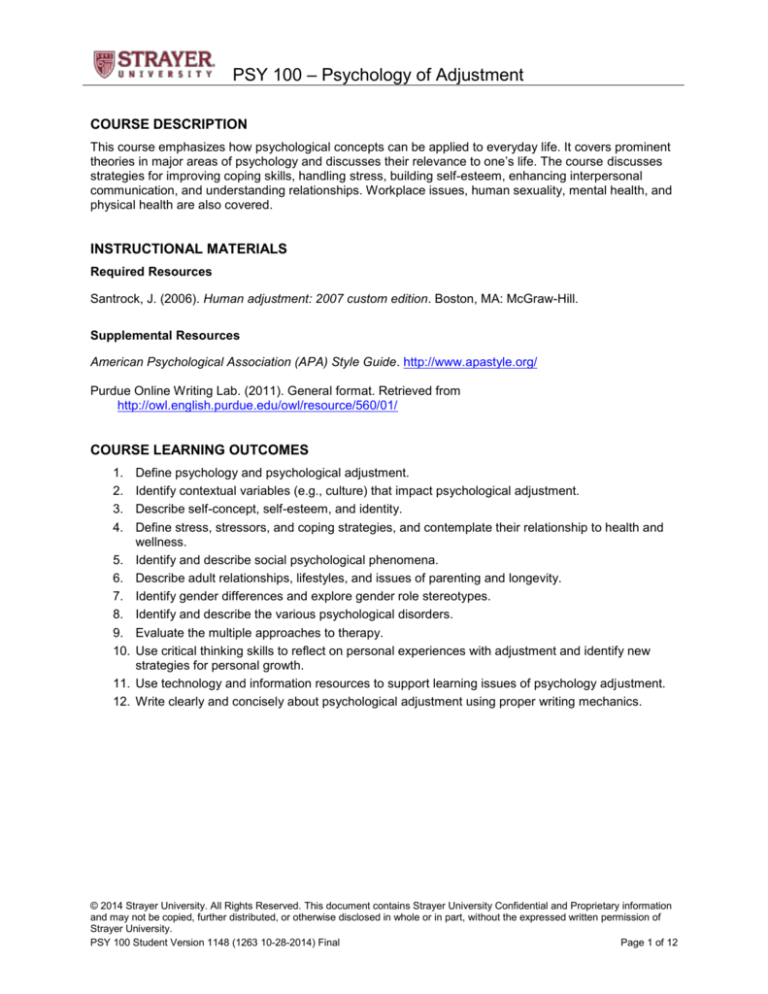
PSY 100 – Psychology of Adjustment
COURSE DESCRIPTION
This course emphasizes how psychological concepts can be applied to everyday life. It covers prominent
theories in major areas of psychology and discusses their relevance to one’s life. The course discusses
strategies for improving coping skills, handling stress, building self-esteem, enhancing interpersonal
communication, and understanding relationships. Workplace issues, human sexuality, mental health, and
physical health are also covered.
INSTRUCTIONAL MATERIALS
Required Resources
Santrock, J. (2006). Human adjustment: 2007 custom edition. Boston, MA: McGraw-Hill.
Supplemental Resources
American Psychological Association (APA) Style Guide. http://www.apastyle.org/
Purdue Online Writing Lab. (2011). General format. Retrieved from
http://owl.english.purdue.edu/owl/resource/560/01/
COURSE LEARNING OUTCOMES
1.
2.
3.
4.
5.
6.
7.
8.
9.
10.
11.
12.
Define psychology and psychological adjustment.
Identify contextual variables (e.g., culture) that impact psychological adjustment.
Describe self-concept, self-esteem, and identity.
Define stress, stressors, and coping strategies, and contemplate their relationship to health and
wellness.
Identify and describe social psychological phenomena.
Describe adult relationships, lifestyles, and issues of parenting and longevity.
Identify gender differences and explore gender role stereotypes.
Identify and describe the various psychological disorders.
Evaluate the multiple approaches to therapy.
Use critical thinking skills to reflect on personal experiences with adjustment and identify new
strategies for personal growth.
Use technology and information resources to support learning issues of psychology adjustment.
Write clearly and concisely about psychological adjustment using proper writing mechanics.
© 2014 Strayer University. All Rights Reserved. This document contains Strayer University Confidential and Proprietary information
and may not be copied, further distributed, or otherwise disclosed in whole or in part, without the expressed written permission of
Strayer University.
PSY 100 Student Version 1148 (1263 10-28-2014) Final
Page 1 of 12
PSY 100 – Psychology of Adjustment
WEEKLY COURSE SCHEDULE
The standard requirement for a 4.5 credit hour course is for students to spend 13.5 hours in weekly work.
This includes preparation, activities, and evaluation regardless of delivery mode.
Week
1
Preparation, Activities, and Evaluation
Points
Preparation
Reading(s)
o Chapter 1: Adjusting to Life
e-Activity
o Read the article titled, “Ecological Systems Theory: You and Your
Environment,” located at https://explorable.com/ecological-systemstheory. Be prepared to discuss.
Activities
Discussion
Evaluation
2
20
None
Preparation
Reading(s)
o Chapter 3: The Self, Identity, and Values
e-Activity
o Read the article titled, “Six Strategies for Building Your SelfConfidence,” located at http://sourcesofinsight.com/six-guidingstrategies-to-build-up-your-self-confidence/. Be prepared to
discuss.
Activities
Discussion
Evaluation
3
Quiz 1: Chapter 1
20
20
Preparation
Reading(s)
o Chapter 4: Stress
e-Activity
o Read the article titled “Stress Management: How to Reduce,
Prevent, and Cope with Stress,” located at
http://www.helpguide.org/mental/stress_management_relief_coping
.htm. Be prepared to discuss.
Activities
Discussion
Evaluation
4
Quiz 2: Chapter 3
20
20
Preparation
Reading(s)
o Chapter 5: Coping
© 2014 Strayer University. All Rights Reserved. This document contains Strayer University Confidential and Proprietary information
and may not be copied, further distributed, or otherwise disclosed in whole or in part, without the expressed written permission of
Strayer University.
PSY 100 Student Version 1148 (1263 10-28-2014) Final
Page 2 of 12
PSY 100 – Psychology of Adjustment
e-Activity
o Read the article titled “How Do You Cope?” located at
http://www.semel.ucla.edu/dual-diagnosisprogram/News_and_Resources/How_Do_You_Cope. Be prepared
to discuss.
Activities
Discussion
Evaluation
5
Quiz 3: Chapter 4
Assignment 1: Personal Reflection Journal Entry
20
20
175
Preparation
Reading(s)
o Chapter 6: Social Thinking, Influence, and Intergroup Relations
Activities
Discussion
Evaluation
6
Quiz 4: Chapter 5
20
20
Preparation
Reading(s)
o Chapter 9: Adult Lifestyles
Activities
Discussion
Evaluation
7
Quiz 5: Chapter 6
20
20
Preparation
Reading(s)
o Chapter 11: Emerging Adulthood, Adult Development, and Aging
Self-Assessment: “Can I Live to be 100?” (located in textbook)
e-Activity
o Watch the video titled, “Nun Study.” (4 min 05 s). Be prepared to
discuss. Video source: Etan Rozin (2006, December 28). Nun Study
[Video file]. Retrieved from
https://www.youtube.com/watch?v=nw2lafKIEio. This video can be
reviewed from within your online course shell.
Activities
Discussion
Evaluation
8
Quiz 6: Chapter 9
20
20
Preparation
Reading(s)
o Chapter 12: Gender
e-Activity
o Watch the video titled “Top 10 Most Sexist Commercials of All
© 2014 Strayer University. All Rights Reserved. This document contains Strayer University Confidential and Proprietary information
and may not be copied, further distributed, or otherwise disclosed in whole or in part, without the expressed written permission of
Strayer University.
PSY 100 Student Version 1148 (1263 10-28-2014) Final
Page 3 of 12
PSY 100 – Psychology of Adjustment
Time!” (3 min 39 s). Be prepared to discuss. Video Source: Beryl
Shereshewsky and Jonathan Tortora. (2012, October 25). Top 10
Most Sexist Commercials of All Time! [Video file]. Retrieved from
http://www.youtube.com/watch?v=ibugG89odt0.
Activities
20
Discussion
Evaluation
9
Quiz 7: Chapter 11
Assignment 2: Adjustment Case Study
20
230
Preparation
Reading(s)
o Chapter 14: Psychological Disorders
e-Activity
o Watch the video titled “The Gestalt Project: Stop the Stigma” (4 min
09 s). Be prepared to discuss. Video Source: Kian Madjedi. (2012,
April 10). The Gestalt Project: Stop the Stigma [Video file].
Retrieved from https://www.youtube.com/watch?v=QficvVNIxTI.
This video can be reviewed from within your online course shell.
Activities
Discussion
Evaluation
10
20
Quiz 8: Chapter 12
20
Preparation
Reading(s)
o Chapter 15: Therapies
Activities
Discussion
Evaluation
11
20
20
Quiz 9: Chapter 14
Preparation
Reading(s): None
Activities
Discussion
Evaluation
20
20
Quiz 10: Chapter 15
GRADING SCALE – UNDERGRADUATE
Assignment
Quizzes (open book with a 1-hour time limit per chapter)
(10 quizzes, covering 10 chapters, 10 questions each chapter, worth 2
Total Points
% of
Grade
200
24%
© 2014 Strayer University. All Rights Reserved. This document contains Strayer University Confidential and Proprietary information
and may not be copied, further distributed, or otherwise disclosed in whole or in part, without the expressed written permission of
Strayer University.
PSY 100 Student Version 1148 (1263 10-28-2014) Final
Page 4 of 12
PSY 100 – Psychology of Adjustment
points apiece)
Assignment 1: Personal Reflection Journal Entry
175
21%
Assignment 2: Adjustment Case Study
230
28%
Participation (11 discussions worth 20 points apiece)
220
27%
Total
825
100%
Points
Percentage
Grade
743 – 825
90% – 100%
A
660 – 742
80% – 89%
B
578 – 659
70% – 79%
C
495 – 577
60% – 69%
D
Below 495
Below 60%
F
© 2014 Strayer University. All Rights Reserved. This document contains Strayer University Confidential and Proprietary information
and may not be copied, further distributed, or otherwise disclosed in whole or in part, without the expressed written permission of
Strayer University.
PSY 100 Student Version 1148 (1263 10-28-2014) Final
Page 5 of 12
PSY 100 – Assignments and Rubrics
Assignment 1: Personal Reflection Journal Entry
Due in Week 4 and worth 175 points
In this assignment, you will review your current level of adjustment.
Write a one to two (1-2) page paper in which you:
1. Reflect on how well you are:
a. adjusting to your life in terms of subjective well-being, diversity, contexts, and / or thinking
critically.
b. balancing your priorities, specifically with home, work, school, recreation, and / or family.
c. developing your identity, specifically self-esteem, self-concept, ethnicity, and / or gender.
d. coping with stress, specifically social support, multiple coping strategies, and / or selfcontrol.
Your assignment must follow these formatting requirements:
Be typed, double-spaced, using Times New Roman font (size 12), with one-inch margins on all
sides; Since the only resources you will be using for this assignment are the article and your
textbook, you need not include a reference page. Check with your professor for any additional
instructions.
Include a cover page containing the title of the assignment, the student’s name, the professor’s
name, the course title, and the date. The cover page is not included in the required assignment
page length.
The specific course learning outcomes associated with this assignment are:
Define psychology and psychological adjustment.
Identify contextual variables (e.g., culture) that impact psychological adjustment.
Describe self-concept, self-esteem, and identity.
Define stress, stressors, and coping strategies, and contemplate their relationship to health and
wellness.
Use critical thinking skills to reflect on personal experiences with adjustment and identify new
strategies for personal growth.
Use technology and information resources to research issues in psychology.
Write clearly and concisely about psychology using proper writing mechanics.
Grading for this assignment will be based on answer quality, logic / organization of the paper, and
language and writing skills, using the following rubric.
Points: 175
Criteria
1. Reflect on
how well you
are adjusting to
your life in
terms of
Exemplary
90%-100%
Thoroughly
reflected on
how well you
are adjusting
to your life in
Assignment 1: Personal Reflection Journal Entry
Meets
Proficient
Fair
Minimum
80%-89%
70%-79%
Expectations
60%-69% D
Satisfactorily
reflected on how
well you are
adjusting to your
life in terms of
Partially reflected
on how well you
are adjusting to
your life in terms
of subjective well-
Insufficiently
reflected on how
well you are
adjusting to your
life in terms of
Unacceptable
Below 60% F
Did not reflect or
incompletely
reflected how well
you are adjusting to
your life in terms of
© 2014 Strayer University. All Rights Reserved. This document contains Strayer University Confidential and Proprietary information
and may not be copied, further distributed, or otherwise disclosed in whole or in part, without the expressed written permission of
Strayer University.
PSY 100 Student Version 1148 (1263 10-28-2014) Final
Page 6 of 12
PSY 100 – Assignments and Rubrics
subjective wellbeing,
diversity,
contexts,
and/or thinking
critically.
Weight: 20%
terms of
subjective wellbeing,
diversity,
contexts,
and/or thinking
critically.
subjective wellbeing, diversity,
contexts, and/or
thinking critically.
being, diversity,
contexts, and/or
thinking critically.
subjective wellbeing, diversity,
contexts, and/or
thinking critically.
subjective wellbeing, diversity,
contexts, and/or
thinking critically.
2. Reflect on
how well you
are balancing
your priorities,
specifically
home, work,
school, family,
and/or
recreation.
Weight: 20%
Thoroughly
reflected on
how well you
are balancing
your priorities,
specifically
home, work,
school, family,
and/or
recreation.
Satisfactorily
reflected on how
well you are
balancing your
priorities,
specifically home,
work, school,
family, and/or
recreation.
Partially reflected
on how well you
are balancing your
priorities,
specifically home,
work, school,
family, and/or
recreation.
Insufficiently
reflected on how
well you are
balancing your
priorities,
specifically home,
work, school,
family, and/or
recreation.
Did not reflect or
incompletely
reflected balancing
priorities specifically
home, work, school,
family, and/or
recreation.
3. Reflect on
how well you
are developing
your identity,
specifically
self-esteem,
self-concept,
ethnicity,
and/or gender.
Weight: 20%
Thoroughly
reflected on
how well you
are developing
your identity,
specifically
regarding selfesteem, selfconcept,
ethnicity,
and/or gender.
Satisfactorily
reflected on how
well you are
developing your
identity,
specifically
regarding selfesteem, selfconcept, ethnicity,
and/or gender.
Partially reflected
on how well you
are developing
your identity,
specifically
regarding selfesteem, selfconcept, ethnicity,
and/or gender.
Insufficiently
reflected on how
well you are
developing your
identity,
specifically
regarding selfesteem, selfconcept, ethnicity,
and/or gender.
Did not reflect or
incompletely
reflected on how
well you are
developing your
identity, specifically
regarding selfesteem, selfconcept, ethnicity,
and/or gender.
4. Reflect on
how well you
are coping with
stress,
specifically
social support,
multiple coping
strategies,
and/or selfcontrol
Weight: 20%
Thoroughly
reflected on
how well you
are coping with
stress,
specifically
social support,
multiple coping
strategies,
and/or selfcontrol.
Satisfactorily
reflected on how
well you are
coping with stress,
specifically social
support, multiple
coping strategies,
and/or self-control.
Partially reflected
on how well you
are coping with
stress, specifically
social support,
multiple coping
strategies, and/or
self-control.
Insufficiently
reflected on how
well you are
coping with stress,
specifically social
support, multiple
coping strategies,
and/or self-control.
Did not reflect or
incompletely
reflected on how
well you are coping
with stress,
specifically social
support, multiple
coping strategies,
and/or self-control.
5. Writing /
Support for
ideas
Weight: 10%
Consistently
uses
explanations,
examples, and
evidence that
logically
support ideas.
Mostly uses
explanations,
examples, and
evidence that
logically support
ideas.
Partially uses
explanations,
examples, and
evidence that
logically support
ideas.
Rarely uses
explanations,
examples, and
evidence that
logically support
ideas.
Never uses
explanations,
examples, and
evidence that
logically support
ideas.
6. Writing /
Grammar and
mechanics
Weight: 10%
Free of errors
in grammar,
spelling, and
punctuation.
Mostly free of
errors in grammar,
spelling, and
punctuation.
Partially free of
errors in grammar,
spelling, and
punctuation.
Numerous errors
in grammar,
spelling, and
punctuation.
Serious and
persistent errors in
grammar, spelling,
and punctuation.
© 2014 Strayer University. All Rights Reserved. This document contains Strayer University Confidential and Proprietary information
and may not be copied, further distributed, or otherwise disclosed in whole or in part, without the expressed written permission of
Strayer University.
PSY 100 Student Version 1148 (1263 10-28-2014) Final
Page 7 of 12
PSY 100 – Assignments and Rubrics
Assignment 2: Adjustment Case Study
Due in Week 8 and worth 230 points
Go to NPR’s StoryCorps Website, located at http://www.npr.org/series/4516989/storycorps. Read two (2)
articles that were published within the last two (2) months that focus on individuals with major adjustment
issues.
Next, use the textbook and / or Strayer Library to research evidence-based strategies to help with
adjustment. Consider strategies that relate to stress and coping, gender, stages of life, cultural and social
issues, and health.
When referencing the selected stories, please use this format:
Standard Format:
o Title of the story [Audio file]. (Year, Month Day). Retrieved from website url.
In-Text Citation Format:
o The in-text citation for a selected story is an abbreviated version of the title and the year of
publication. The abbreviation contains the first three words of the title.
Example:
A homeless teen finds solace in a teacher and a recording [Audio file]. (2014, March
7). Retrieved from http://www.npr.org/2014/03/07/286921391/a-homeless-teen-findssolace-in-a-teacher-and-a-recording.
Example:
(“A homeless teen,” 2014).
Textbook Citation Format:
o Author's Name. (Date of publication). Title of the resource. Publisher information.
Example:
Santrock, J. (2006). Human adjustment: 2007 custom edition. Boston, MA: McGrawHill.
Write a three to six (3-6) page paper in which you:
1. Summarize the two (2) articles you selected from the NPR Website.
2. Describe the major adjustment issues discussed in each story.
3. Examine at least three (3) evidence-based strategies from the selected articles that could help
the individuals enhance their adjustment skills.
4. Recommend the evidence-based strategy that is best suited for the people in the selected
articles. Provide a rationale for your response.
5. Use at least four (4) quality academic resources in this assignment. Note: Wikipedia and other
similar websites do not qualify as academic resources.
Your assignment must follow these formatting requirements:
Be typed, double-spaced, using Times New Roman font (size 12), with one-inch margins on all
sides; Since the only resources you will be using for this assignment are the article and your
© 2014 Strayer University. All Rights Reserved. This document contains Strayer University Confidential and Proprietary information
and may not be copied, further distributed, or otherwise disclosed in whole or in part, without the expressed written permission of
Strayer University.
PSY 100 Student Version 1148 (1263 10-28-2014) Final
Page 8 of 12
PSY 100 – Assignments and Rubrics
textbook, you need not include a reference page. Check with your professor for any additional
instructions.
Include a cover page containing the title of the assignment, the student’s name, the professor’s
name, the course title, and the date. The cover page is not included in the required assignment
page length.
The specific course learning outcomes associated with this assignment are:
Identify contextual variables (e.g., culture) that impact psychological adjustment.
Define stress, stressors, and coping strategies, and contemplate their relationship to health and
wellness.
Identify and describe social psychological phenomena.
Describe adult relationships, lifestyles, and issues of parenting and longevity.
Identify gender differences and explore gender role stereotypes.
Use technology and information resources to research issues in psychology.
Write clearly and concisely about psychology using proper writing mechanics.
Grading for this assignment will be based on answer quality, logic / organization of the presentation, and
language and writing skills, using the following rubric.
Points: 230
Criteria
Exemplary
90%-100%
Assignment 2: Adjustment Case Study
Meets
Proficient
Fair
Minimum
Unacceptable
80%-89%
70%-79%
Expectations Below 60% F
60%-69% D
1. Summarize
the two (2)
articles you
selected from
the NPR
Website.
Weight: 20%
Thoroughly
summarized two
(2) articles
selected from
the NPR
Website.
Satisfactorily
summarized two
(2) articles
selected from the
NPR Website.
Partially
summarized two
(2) articles
selected from
the NPR
Website.
Insufficiently
summarized two
(2) articles
selected from
the NPR
Website.
Did not identify
and/or
summarize two
(2) articles
selected from
the NPR
Website.
2. Describe the
major
adjustment
issues
discussed in
each story.
Weight: 20%
Thoroughly
described the
major
adjustment
issues
discussed in
their story
selection.
Satisfactorily
described the
major adjustment
issues discussed
in their story
selection.
Partially
described the
major
adjustment
issues
discussed in
their story
selection.
Insufficiently
described the
major
adjustment
issues
discussed in
their story
selection.
Did not describe
the major
adjustment
issues
discussed in
their story
selection.
3. Examine at
least three (3)
evidence-based
strategies from
the selected
articles that
could help the
individuals
enhance their
adjustment
skills.
Weight: 20%
Thoroughly
examined at
least three (3)
evidence-based
strategies from
the selected
articles that
could help the
individuals
enhance their
adjustment
skills.
Satisfactorily
examined at
least three (3)
evidence-based
strategies from
the selected
articles that
could help the
individuals
enhance their
adjustment skills.
Partially
examined at
least three (3)
evidence-based
strategies from
the selected
articles that
could help the
individuals
enhance their
adjustment
skills.
Insufficiently
examined at
least three (3)
evidence-based
strategies from
the selected
articles that
could help the
individuals
enhance their
adjustment
skills.
Incompletely
examined at
least three (3)
evidence-based
strategies from
the selected
articles that
could help the
individuals
enhance their
adjustment
skills.
© 2014 Strayer University. All Rights Reserved. This document contains Strayer University Confidential and Proprietary information
and may not be copied, further distributed, or otherwise disclosed in whole or in part, without the expressed written permission of
Strayer University.
PSY 100 Student Version 1148 (1263 10-28-2014) Final
Page 9 of 12
PSY 100 – Assignments and Rubrics
4. Recommend
the evidencebased strategy
that is best
suited for the
people in the
selected articles.
Provide a
rationale for your
response.
Weight: 20%
Thoroughly
recommended
the evidencebased strategy
that is best
suited for the
people in the
selected
articles. Provide
a rationale for
your response.
Satisfactorily
recommended
the evidencebased strategy
that is best
suited for the
people in the
selected articles.
Provide a
rationale for your
response.
Partially
recommended
the evidencebased strategy
that is best
suited for the
people in the
selected articles.
Provide a
rationale for
your response.
Insufficiently
recommended
the evidencebased strategy
that is best
suited for the
people in the
selected articles.
Provide a
rationale for
your response.
Incompletely
recommended
the evidencebased strategy
that is best
suited for the
people in the
selected
articles. Provide
a rationale for
your response.
5. Writing /
Support for
ideas
Weight: 5%
Consistently
uses
explanations,
examples, and
evidence that
logically support
ideas.
Mostly uses
explanations,
examples, and
evidence that
logically support
ideas.
Partially uses
explanations,
examples, and
evidence that
logically support
ideas.
Rarely uses
explanations,
examples, and
evidence that
logically support
ideas.
Never uses
explanations,
examples, and
evidence that
logically support
ideas.
6. Writing /
Grammar and
mechanics
Weight: 5%
Free of errors in
grammar,
spelling, and
punctuation.
Mostly free of
errors in
grammar,
spelling, and
punctuation.
Partially free of
errors in
grammar,
spelling, and
punctuation.
Numerous
errors in
grammar,
spelling, and
punctuation.
Serious and
persistent errors
in grammar,
spelling, and
punctuation.
7. Information
Literacy /
Crediting
Sources in APA
Weight: 5%
Consistently
shows correct
use of In-text
citations with
matching
references using
APA format.
Mostly shows
correct use of intext citations with
matching
references using
APA format.
Partially shows
correct (or
approximately
correct) use of
in-text citations,
with matching
references using
APA format.
In-text citations
and references
are given, but
not in APA
format.
Lack of citations
and / or lack of
reference
section and / or
citations don’t
correspond to
listed
references.
8. Information
Literacy /
Research
Weight: 5%
Four (4) or more
sources are
used and the
quality of
sources is good.
Three (3)
sources are used
and the quality of
sources is mostly
good.
Two (2) sources
are used and /
or the quality of
sources is
questionable.
One (1) source
is used and / or
references are
of poor quality.
No sources are
used and / or
quality of
sources are
unacceptable.
© 2014 Strayer University. All Rights Reserved. This document contains Strayer University Confidential and Proprietary information
and may not be copied, further distributed, or otherwise disclosed in whole or in part, without the expressed written permission of
Strayer University.
PSY 100 Student Version 1148 (1263 10-28-2014) Final
Page 10 of 12
PSY 100 – Student Notes
Weekly Course Schedule
The purpose of the course schedule is to give you, at a glance, the required preparation, activities, and
evaluation components of your course. For more information about your course, whether on-ground or
online, access your online course shell.
The expectations for a 4.5 credit hour course are for students to spend 13.5 hours in weekly work. This
time estimate includes preparation, activities, and evaluation regardless of the delivery mode.
Instructional Materials
In order to be fully prepared, obtain a copy of the required textbooks and other instructional materials
prior to the first day of class. When available, Strayer University provides a link to the first three (3)
chapters of your textbook(s) in eBook format. Check your online course shell for availability.
Review the online course shell or check with your professor to determine whether Internet-based
assignments and activities are used in this course.
Strayer students are encouraged to purchase their course materials through the Strayer Bookstore.
http://www.strayerbookstore.com. If a lab is required for the course, the Strayer Bookstore is the only
vendor that sells the correct registration code so that Strayer students may access labs successfully.
Discussions
To earn full credit in an online threaded discussion, students must have one original post and a minimum
of one other post per discussion thread.
Please note: Material in the online class will be made available three weeks at a time to allow students to
work ahead, however, faculty will be focused on and responding only to the current calendar week. As it
is always possible that students could lose their work due to unforeseen circumstances, it is a best
practice to routinely save a working draft in a separate file before posting in the course discussion area.
Professors hold discussions during class time for on-ground students. Check with your professor if any
additional discussion participation is required in the online course shell outside of class hours.
Tests
Tests (quizzes, midterm and final exams, essay exams, lab tests, etc.) are available for student access
and completion through the online course shell. Check the online course shell to determine how students
are expected to take the tests. Do not change these questions or their point values in any way. This
disrupts the automated grade book preset in the online course shell.
Online students are to complete the test by Monday 9:00 a.m. Details regarding due dates are
posted in the Blackboard Calendar tool.
On-ground students are to complete the tests after the material is covered and before the next
class session.
Assignments
A standardized performance grading rubric is a tool your professor will use to evaluate your written
assignments. Review the rubric before submitting assignments that have grading rubrics associated with
them to ensure you have met the performance criteria stated on the rubric.
Grades are based on individual effort. There is no group grading; however, working in groups in the
online or on-ground classroom is acceptable.
© 2014 Strayer University. All Rights Reserved. This document contains Strayer University Confidential and Proprietary information
and may not be copied, further distributed, or otherwise disclosed in whole or in part, without the expressed written permission of
Strayer University.
PSY 100 Student Version 1148 (1263 10-28-2014) Final
Page 11 of 12
PSY 100 – Student Notes
Assignments for online students are always submitted through the online course shell. On-ground
professors will inform students on how to submit assignments, whether in paper format or through the
online course shell.
Resources
The Resource Center navigation button in the online course shell contains helpful links. Strayer University
Library Resources are available here as well as other important information. You should review this area
to find resources and answers to common questions.
Technical support is available for the following:
For technical questions, please contact Strayer Online Technical Support by logging in to your
iCampus account at https://icampus.strayer.edu/login and submitting a case under “Student
Center,” then “Submit Help Ticket.” If you are unable to log in to your iCampus account, please
contact Technical Support via phone at (877) 642-2999.
For concerns with your class, please access the Solution Center by logging in to your iCampus
account at https://icampus.strayer.edu/login and submitting a case under “Student Center,” then
“Submit Help Ticket.” If you are unable to log in to your iCampus account, please contact the IT
Help Desk at (866) 610-8123 or at mailto:IThelpdesk@Strayer.edu.
TurnItIn.com is an optional online tool to assess the originality of student written work. Check with your
professor for access and use instructions.
The Strayer Policies link on the navigation bar in the online course shell contains academic policies. It is
important that students be aware of these policies.
© 2014 Strayer University. All Rights Reserved. This document contains Strayer University Confidential and Proprietary information
and may not be copied, further distributed, or otherwise disclosed in whole or in part, without the expressed written permission of
Strayer University.
PSY 100 Student Version 1148 (1263 10-28-2014) Final
Page 12 of 12

